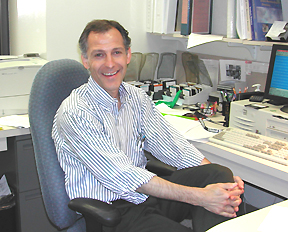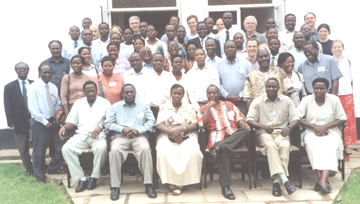
| T H E N I H C A T A L Y S T | M A Y – J U N E 2002 |
|
|
|
RESEARCH ETHICS IN DEVELOPING COUNTRIES:NIH COURSE OPENS A TWO-WAY STREET |
by Fran Pollner
|
 |
|
Zeke
Emanuel
|
In a clinical research study in Malawi involving children who had succumbed to severe malaria, investigators paid for the casket and the post-autopsy transport of bodies back to the village in order to be able to perform autopsies to learn more about the pathogenesis of cerebral malaria. "In this country [the United States]," Zeke Emanuel observes, "some people might call that undue inducement" to secure consent for autopsy.
"But," he says, "this is not something to pontificate over. This is an example of an ethical dilemma for which there is no obvious judgment. This is a case of our needing to learn about the cultural practices [that inform] death and burial in Malawi, the realities of moving bodies around in that country." For every country, he says, there is a context that defines the ethical boundaries of clinical research.
Emanuel is the director of the Department of Clinical Bioethics at the Clinical Center and has been conducting ethics grand rounds at NIH and—with Christine Grady, head of the department’s section on human subjects research—leading a course in clinical research ethics since his arrival here in 1998. Last year, the department started taking the show on the road–to developing countries in Africa with substantial numbers of NIH-supported research protocols in malaria, AIDS, and other infectious diseases.
In March 2001, Blantyre, Malawi, became the site of the first course on "Ethical and Regulatory Aspects of Clinical Research in Developing Countries."
The idea to create such a course emerged from conversations begun in the summer of 2000 between Emanuel, Grady, and Libby Higgs, program officer for NIAID’s International Tropical Disease Research Program.
These conversations expanded to overseas contacts, course content was taking shape, and Emanuel had already planned travel to Malawi and Mali to get "on the ground" exposure to clinical research realities there when The Washington Post published a six-part exposé of clinical research abuses in developing countries. Called "The Body Hunters," the series ran in late December 2000 and detailed the harm done to indigenous research subjects enrolled in trials sponsored largely by outside drug companies. It had no effect on course development, per se, but the six articles were included in the voluminous notebook of background reading handed out to every participant.
The Malawi course was attended by 47 people from 11 countries; it generated collaborations that are producing cross-cultural dialogue, empirical research on ethical aspects of clinical research, and position papers on such increasingly relevant and pressing issues as "reasonable availability," or the extent to which researchers are obligated to provide a successful drug to the inhabitants of the country in which the drug trial took place. Some attendees in Malawi were asked to be teachers in later courses; others were so excited by the course, they returned to their homes set on arranging to bring it there (see "Bringing the Course Back Home"for one example).
 |
|
photo by Reidar Lie
|
|
In
Uganda, March 2002
|
This year, in March, the course was held at two more African sites: Accra, Ghana, and Entebbe, Uganda. Two more sites are on the docket: Seoul, Korea, in June, and Cairo, Egypt, early next year. Another session in Uganda and one in Mali, in preparation for a series of malaria vaccine trials, are also anticipated.
To enhance its resources to build ethics capacity in developing countries and to explore ethical issues in the international context, the CC department recently recruited Reidar Lie, a physician and philosopher from the University of Bergen, Norway, to head a section on international programs. Lie, who has related experience in WHO and the European Union, is also one of the course’s lecturers; James Lavery, a bioethicist at the Fogarty International Center, is also among the course’s NIH contingent.
In each course, local investigators present a local case that illustrates each of the ethical issues explored in the lectures: randomization, placebo controls, subject recruitment, financial incentives, research with stored biological samples, risk-benefit assessments, conflict of interest, individual and community informed consent, measuring community benefits of clinical research, and the ethics of treating nonresearch-related health conditions. The composition and role of institutional review boards is also addressed. (Emanuel notes that he’s found the level of IRB sophistication quite variable among the African nations, with Mali, for instance, practicing a degree of oversight that the United States could do well to emulate.)
That the flow of information that transpires during the course is very much a two-way street is reflected in how Emanuel describes course objectives:
![]() To provide African clinical researchers with a systematic framework for thinking
about the core ethical issues contained in the course.
To provide African clinical researchers with a systematic framework for thinking
about the core ethical issues contained in the course.
![]() To foster interaction about ethical issues among researchers who often don’t
know one another.
To foster interaction about ethical issues among researchers who often don’t
know one another.
![]() To teach the non-African instructors how cultural, economic, social, and political
issues impinge on the conduct of clinical research in other countries and how
researchers there have navigated these challenges. ("Americans, Emanuel
remarks, "can learn an enormous amount from [African researchers] about
community education on research, mobilization around research, and community
consultation on the structure and design of research. We talk a lot about it.
They’ve done it—for more than a decade in some cases. They have experience
and sophistication.")
To teach the non-African instructors how cultural, economic, social, and political
issues impinge on the conduct of clinical research in other countries and how
researchers there have navigated these challenges. ("Americans, Emanuel
remarks, "can learn an enormous amount from [African researchers] about
community education on research, mobilization around research, and community
consultation on the structure and design of research. We talk a lot about it.
They’ve done it—for more than a decade in some cases. They have experience
and sophistication.")
![]() Related to the last objective, to induce African clinical researchers who have
acquired such wisdom but have not imparted it to people outside their own circles
to write papers about these issues and to assume leadership positions on the
international stage.
Related to the last objective, to induce African clinical researchers who have
acquired such wisdom but have not imparted it to people outside their own circles
to write papers about these issues and to assume leadership positions on the
international stage.
"Many controversies in multinational clinical research are steered by academics sitting in comfortable places who have never visited these countries and don’t understand the lay of the land," Emanuel says. "We desperately need people who are from the area who can speak authoritatively—not just because they have experience but because they’ve actually thought through the ethical issues."
Ambrose Talisuna, a member of the Multilateral Initiative on Malaria and the Uganda Ministry of Health, Kampala, is an example (see "Coming to the Fore"). After attending the course in Malawi, Talisuna was prevailed upon to deliver lectures at the next two. "He probably gave the single best lecture—one on conflict of interest—at [the Ghana] meeting. The world could benefit from his being a spokesperson on bioethical issues," Emanuel said, and then quickly started naming other African researchers as he pointed to a list of about 30 coauthors of a newly minted paper on reasonable availability. The paper arose from a spontaneous discussion and ensuing consensus after the Malawi course ended. A draft was circulated to all contributors and over the course of a year was refined to the point of its being submitted to the New England Journal of Medicine. David Wendler, of the department, is leading a similar process to reach consensus on whether and to what extent clinical researchers ought to treat the multiple health problems of people enrolled in a clinical trial.
The course itself lasts
three days, but teaching, learning, collaborating on new projects, and translating
ideas into actions continue indefinitely. ![]()
| Coming to the Fore | Bringing the Course Back Home | ||||
During a telephone conversation in April with the CC’s Department of Clinical Bioethics about a joint project involving an ethics substudy of an existing clinical research protocol in his country, Ugandan researcher Ambrose Talisuna spoke with The NIH Catalyst about the impact of the department’s course, "Ethical and Regulatory Aspects of Clinical Research in Developing Countries." For him personally, Talisuna said, attending the first course and lecturing at the next two inspired a commitment to the discipline of bioethics. Of particular importance in his field of clinical research—malaria—is the handling of stored blood samples for future use; among other compelling ethical issues are distinctions between the ethics of clinical care and the ethics of medical research, financial conflict of interest, and individual consent vs. community consent (viewed differently by NIH and within his country). Although very little
time has elapsed since the course occurred, already there are signs of
change to come. "In Entebbe, we will see changes in the IRBs. And
there will be better protocols because IRB members will be paying attention
to certain things not discussed before. After my presentation in Entebbe,"
Talisuna said, "I was asked to look at protocol review in Uganda."
|
Maged El Setouhy attended the CC Department of Clinical Bioethics course in Malawi in March 2001 and has been arranging ever since to bring it to Egypt in March 2003. A clinical researcher funded by NIAID to conduct studies on filariasis therapies, El Setouhy is chairman of a regional WHO program and an assistant professor of community, environmental, and occupational medicine at the Ain Shams University, Cairo. For his own country and the four other countries that comprise his region—Yemen, Saudi Arabia, Oman, and Sudan—the establishment of formal national IRBs is an important issue he hopes will be catalyzed by the course (local IRBs, he noted, can be ad hoc panels of the friends of a researcher embarking on a project). The course will also be a "good way to raise the issue of needing to add bioethics to the medical school curriculum," El Setouhy said. "Students need to know why it is wrong to do liver biopsies on normal people in a case-control study devised to satisfy one’s thesis requirement," he said, recalling just such a circumstance. Like Uganda’s Ambrose Talisuna, El Setouhy has encountered differences in NIH’s and his own culture’s perspective regarding informed consent, with NIH placing more importance on the actual signature of a research subject as opposed to local acceptance of the signature of a close kin (of a minor or someone who cannot read) in the context of true education. "The traditions and values of each region must be respected," he commented, noting that he and NIH have negotiated mutually acceptable compromises when such conflicts arise. After the Malawi
seminar, El Setouhy returned to Egypt with three copies of the ethics
coursebook. He keeps one in his office as a reference and as a text for
the members of his group, who read and discuss it. He placed another in
the library and gave the third to a proposal-writing colleague. |